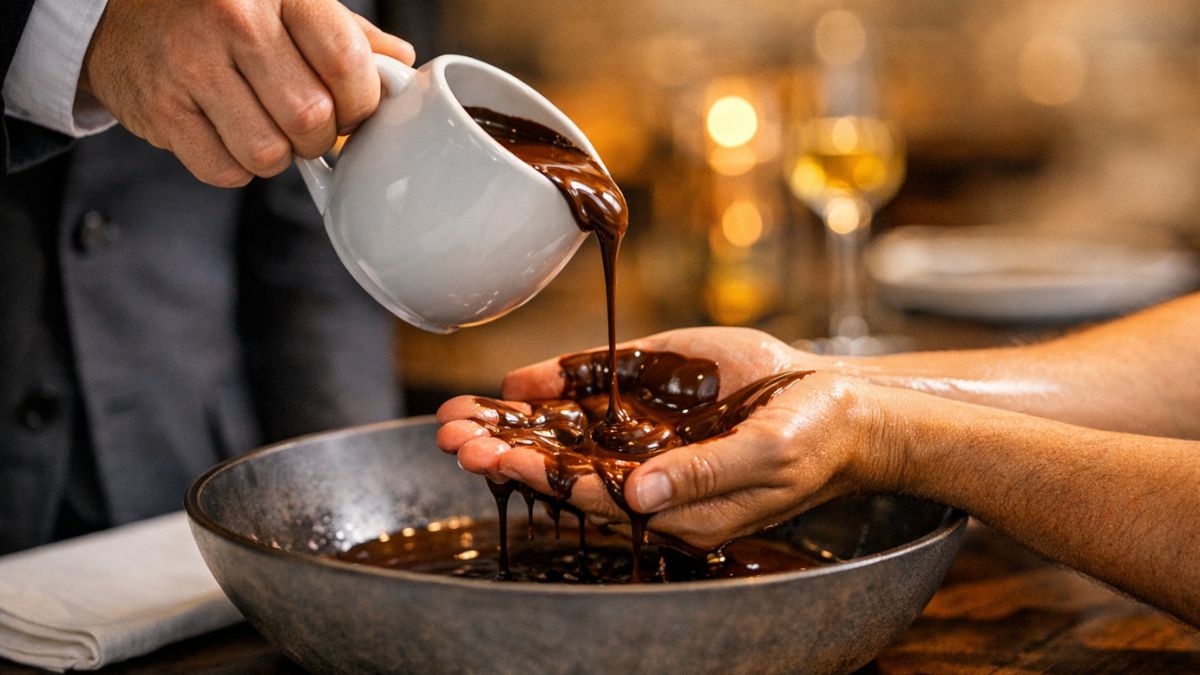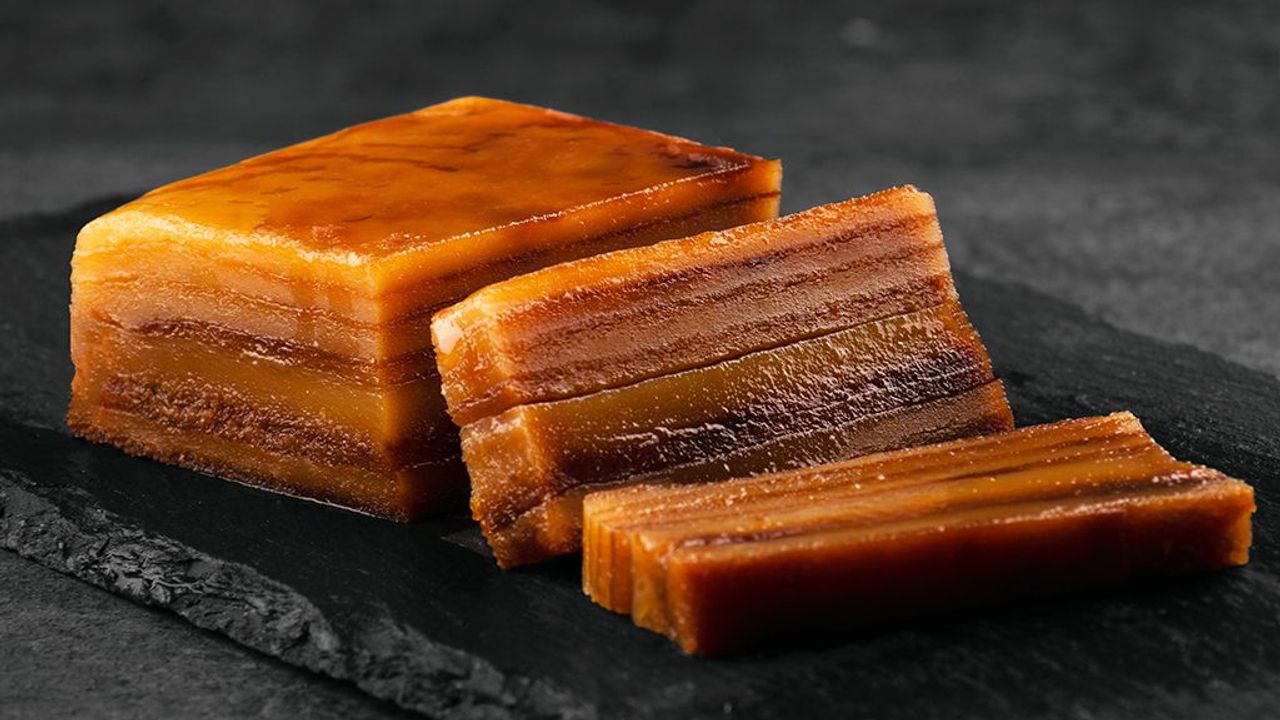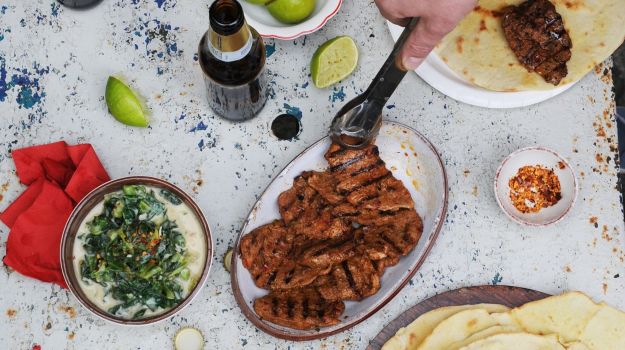“Don’t be put off by bringing together three elements simultaneously. If you follow our kitchen countdown carefully, you’ll never be doing more than one thing at a time,” says Henry Dimbelby. Photograph: Jill Mead for the GuardianThere’s nothing like jerk marinade to impress a group of guests. Combining it with succulent pork, exotic seasonal greens and tactile roti wraps, we pay tribute to London’s street-food scene with this winning bank holiday barbecue.Over the past few years, London has become the street food capital of the world. Across the city, in disused car parks and abandoned warehouses, buzzing food markets are bringing light and energy to the city’s dark, derelict and underused spaces. And the food they are serving is easily as good as some of our best restaurants.
Each trader tends to focus on just one hero dish. They aren’t distracted by landlords, wine lists and staff training. They spend their lives obsessing over every single ingredient to achieve that balance of fat, sweetness, salt, sour and texture that constitutes the perfect dish. It’s just what Michelin-star restaurants do, but without all the other faff they use to justify charging £100 a head.
It’s also a world where talent rises quickly to the top. It costs hundreds of thousands of pounds to start a restaurant, but anyone with a great idea and a willingness to work hard can start a street-food stall. The ones who add talent to the mix create followings as passionate as any Milifandom.
My current favourite trader is Adrian Luckie from Mama’s Jerk. He serves archetypal street food: simple bold flavours made to his late grandmother Mama Charlotte’s secret recipe for jerk pork and chicken. I’ve been trying to persuade Adrian to pass on his nan’s secrets for some time, but he says I’d have to prise the recipe from his cold dead fingers. So this is Jane’s version – our tribute to Mama Charlotte. Turn up the stereo, head to the garden and raise a glass of Appleton’s to the queen of jerk.
Note: Our purpose in this column is to help nervous cooks prepare lunch or dinner for larger numbers of people. It is hard to go wrong with Jane’s powerful jerk seasoning. It has the perfect jerk balance – musky aromas from the allspice, spicy sweetness from the ginger, savoury body from the soy and garlic and, of course, chilli heat.
Purists might be appalled that we use standard red chillies in place of scotch bonnets and that there is no thyme in the recipe. The first is because they are easier to get hold of and the latter because it simplifies things. The vinegar is also a debated addition, but we think it adds tang.
Don’t be put off by the idea of bringing together three elements of a dinner simultaneously. If you follow our kitchen countdown carefully, you should never be doing more than one thing at a time. The coconut greens are a revelation – you will find yourself using the recipe all the time – and making your own roti is much easier than it looks. They also provide the perfect hand-held street-food vessel for the meat.

The most likely mistake is overcooking the meat – so take particular care here. If you are at all unsure, do just one first and cut into it to check you have got it right.
Jerk pork
Serves 6
1.5 kg pork fillets
2 bay leaves
For the marinade
5 fresh red chillies, roughly chopped (the standard long cayenne ones or the smaller Thai bird’s eyes if you can’t get the cayenne)
2 garlic cloves, peeled
1 tsp smoked garlic powder (optional)
1 bunch spring onions, roughly chopped
3cm piece ginger, peeled and chopped
2 tbsp sambal oelek (or /other hot chilli paste
50ml rapeseed oil
1 tbsp rice vinegar
1 tsp ground allspice
50ml soy sauce
1To make the marinade, blend together all the ingredients.
2To prepare the pork fillet and marinate it, trim it to remove any sinew, and slice across the fillet diagonally to cut it into pieces that are 1-2 cm thick. Place in a container with the bay leaves and rub the marinade through. Leave to marinate overnight.
3Cook your pork in batches. First, heat an oven to it’s lowest setting, just 60C/140F if possible. Heat a heavy-based griddle pan (or a barbecue, which you will have already lit) until very hot. Grill the pork fillet pieces for 2 minutes a side until almost firm to the touch. The pork can be served slightly pink. Keep the pork in the oven until it is ready to serve.
4Thicken and perfect your marinade by simmering what’s left in the pan with a little water for 10 minutes, then pour this over the pork for extra jerkiness.
Roti
300g strong flour
½ tsp bicarbonate of soda
½ tsp baking powder
1 tsp salt
1 tbsp butter
200ml water
Rapeseed/coconut oil for cooking
1To make the roti dough, mix all the dry ingredients in a large bowl. Rub in the butter and slowly add the water. Bring the dough together into a ball and knead for about 5 minutes. Divide the dough into 6 balls and cover with a clean cloth. Let it rest for at least 30 minutes.
2To cook the roti. Roll out each ball as thinly as possible on a lightly floured surface and shape them into your roti – it should look like a rough disc. Heat a skillet or heavy-based frying pan. Rub a little oil on to the first roti and cook for 2 minutes a side until slightly browned. Repeat with the other balls. Keep the rotis warm by wrapping them in a cloth while the rest are cooking.
Coconut greens
500g spring greens, trimmed, washed and thinly sliced
1 tbsp rapeseed oil
3 garlic cloves, crushed
1 tsp dried chilli flakes
400ml tin coconut milk
Juice of ½ lime
Salt and black pepper
1To prepare your coconut greens, trim, wash and thinly slice the veg. Boil in a large pan of salted water for 2 minutes. Drain and refresh under cold running water in a colander. Squeeze out any excess water.
2Make the sauce for your greens. Heat the oil in a large pan and cook the garlic and chilli for one minute. Do not allow them to turn brown. Add the coconut milk and cook over a high heat for about 5 minutes, or until the volume has reduced by half.
3Toss the greens and sauce together. Add the greens and stir to combine. Simmer for 5 minutes, until the greens are just coated with the coconut milk. Season and finish with lime juice.
- Henry Dimbleby is co-founder of the natural fast-food restaurant chain Leon @henry_leon. Jane Baxter is a chef and food writer based in Devon @baxcooka















